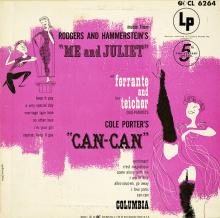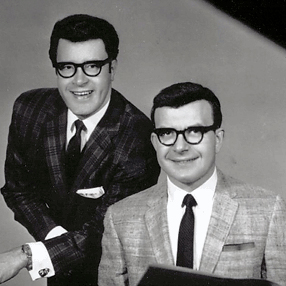Me and Juliet & Can-Can
- Keep It Gay
- A Very Special Day
- Marriage Type Love
- No Other Love
- I'm Your Girl
- Keep It Gay (Reprise)
- Montmart
- C'est Magnifique
- Come Along With Me
- I Am In Love
- Allez-Vous-En, Go Away
- I Love Paris
- Can-Can
Lp released in 1953.
Lp (mono): Columbia CL-6264
CD: Collectables COL-CD-6692 (2-on-1 with Continental Holiday)
See also Broadway to Hollywood
No theatrical season boasting musical comedies by Rodgers & Hammerstein and Cole Porter can be accused of lacking interest. Nor can a record by the two-piano team of Art Ferrante and Lou Teicher be open to the same accusation. The wit, the grace and the invention that is an integral part of scores by Porter or Rodgers is mirrored in the lively piano transcriptions of this remarkable duo. On this record, they offer highlights from two of Broadway’s most ingratiating scores, wherein the masters of musical comedy prove that their skill is as refreshing as ever.
Any Rodgers-Hammerstein collaboration is full of promise, and in Me and Juliet, which opened May 28, 1953 and immediately proceeded to break records at the theater which previously had housed South Pacific, the promise was again fulfilled. Turning away from such distinguished adaptations as Oklahoma!, The King and I and the fabulous war-time romance, they provided an original musical comedy, as opposed to their previous ‘musical plays.’ Moreover, this show was about the theater, a highly public love of both Rodgers and Hammerstein, and their very real affection for their profession shone through in every scene.
In moving from the more serious efforts towards conscious gaiety in plot and lyrics, Oscar Hammerstein II gave his collaborator a similar opportunity. An in Me and Juliet Richard Rodgers has created a score that has the lilt and sunniness of many of his earlier compositions written with the late Lorenz Hart. From the opening chords of Keep It Gay on this record the music is unmistakably Rodgers’, with characteristic melodic surprises in its lively tunes, and a surpassing quote of the deep, rich ballads that are his alone. In keeping with their tradition of never letting a good tune go to waste, one of the songs in the score is an adaptation of a theme Rodgers wrote for the television production “Victory At Sea.” This is the charming No Other Love, which forms the climax of the Ferrante and Teicher potpourri.
Cole Porter’s long-time familiarity with Paris is sufficient assurance that his score for Can-Can has an authentic flavor of the city of lights. Countless trips to the city, and frequent residence there, have provided him with a feeling for the tempo and atmosphere of the town, even in a production dealing with a time that considerably ante-dates him. Music-hall Paris in the gas-lit era still survives as a strong tradition, however, and it is that tradition that he echoes in his music. The craftsmanship always evident in a Porter score is as sure as ever, and the fact that he writes his own lyrics gives his compositions a definite and personal kind of unity.
For Can-Can he has created some of his most attractive numbers, each touched with Gallic flavor. Montmart’, the Can-Can and other lively tunes reflect the rowdy aspects of the period, while in such ballads as I Am In Love and the pretty waltz Allez-vous-en, he conjures up a special picture of romance. The Ferrante and Teicher arrangements, with their own references to French composers, underline the Parisian feeling of the Porter score, and provide a brisk survey of a memorably Broadway musical.
On this record, Art Ferrante and Lou Teicher depart from their customary recorded style to provide fetching readings of musical comedy music. Heretofore on records they have been noted for an iconoclastic approach that treads along the edges of insanity. Using only two pianos and the marvels of magnetic tape, they have constructed a series of weird and wonderful sounds around some zany arrangements that have been as impolite to classic tunes as they were to popular songs. But as a change of pace, and to prove that they do respect composers, they play the songs on this record with immense charm and sensitivity, assisted by a rhythm group composed of Bunny Shawker on drums, Jack Lesberg on bass and Anthony Gottuso on guitar.
Their dynamic work has been a staple of radio and concert repertoire for several years, and since 1947 they have been making regular cross-country concert tours with programs ranging from Bach to modern contemporaries. Two of the youngest students ever to be accepted at the Juilliard School of Music, they began together at the age of six, and soon combined their studies and ensemble teachers. After graduation, they joined the faculty of the school and began the experiments that led to their uninhibited and refreshing approach to recorded piano techniques; some of their innovations may be heard on this record. To some of Broadway’s newest and most delightful music, they bring an interpretation that is altogether right: right for the music, right for the listener. And in so doing, they provide many minutes of superior listening pleasure.

